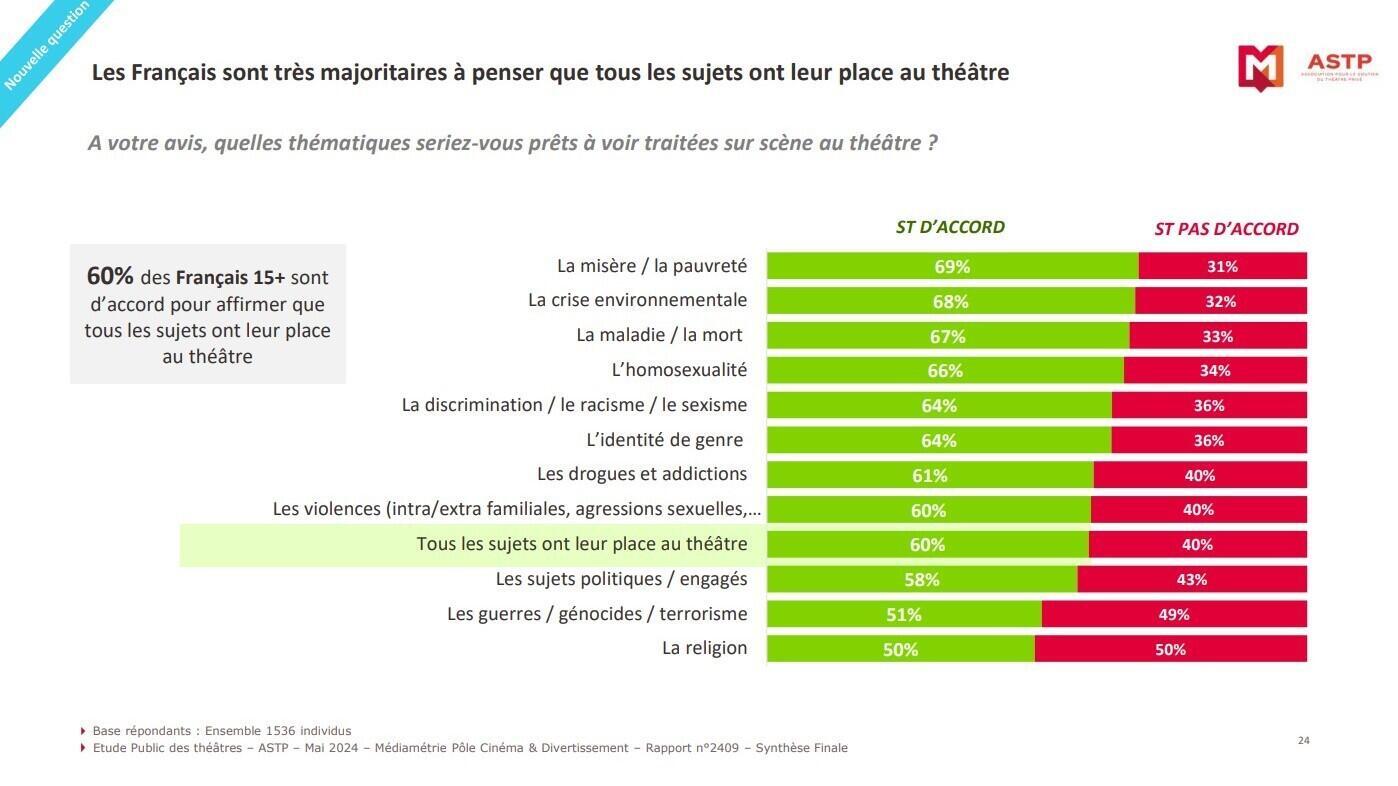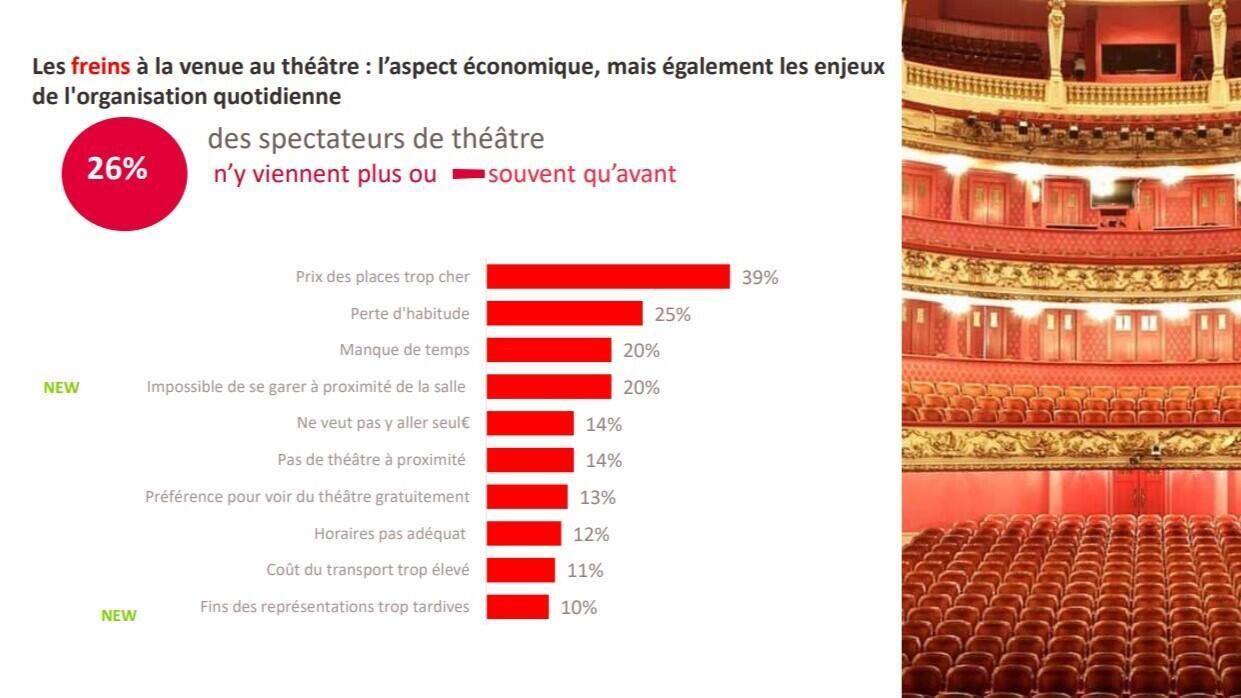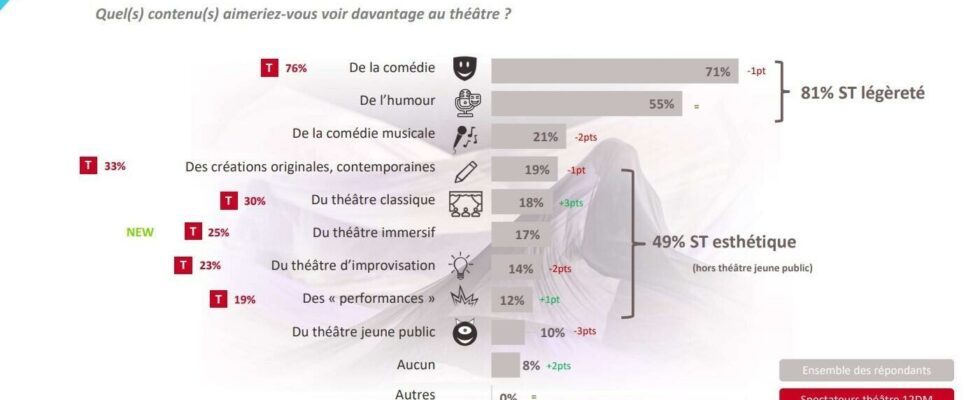After the Covid-19 epidemic, the greatest danger for theater in France seems to be “ self-censorship on the part of programmers » and a possible victory for the far right in the legislative elections: “ It would be a disaster if all this happened. “. A week before the opening of the Avignon Festival, Médiamétrie published a survey on June 20, “The French and the theater”. Surprising result: the French are going to see plays more and more. And spectators favor themes such as poverty, ecology, homosexuality, racism or gender identity… Interview with Pascal Guillaume, president of the Association for the Support of Private Theater (ASTP) which commissioned the ‘study.
RFI : The French and the theater in 2024. What surprised you the most in this survey launched by the ASTP with Médiamétrie ?
Pascal Guillaume : Surprised, rather in a good way, that in the last twelve months there were more spectators in the theater than 2019, which was a reference year, and that there were more and more young people in the theater. I find this super interesting.
Another very surprising result from this study : the 1 536 representative people surveyed throughout France say they have seen an average of 6.2 theater performances over the last twelve months. This is more than 0.8 compared to the previous report and more than the 5 times per year which appear in studies on cinema attendance.
This is declarative, that is to say we have no proof that they really went to the theater more than six times during the year. As we ask the question of how many times have you gone to the theater and it can be all forms of theater, don’t people add a little more than the reality? That still seems like a lot to me, more than six times a year!
This perhaps also means that theater remains of great value to the French.
No doubt, because we still lost a lot of audiences with Covid. We also had difficulty attracting young people to our theaters. Today, we see that more and more of them are coming there. I think that theater is undergoing a transformation. I have the impression that we are in the process of deleting, correcting this somewhat dusty image.
Read alsoTiago Rodrigues: “The Avignon Festival is more urgent than ever”
At the question : “ What themes would you be ready to see covered on stage at the theater ? », the French respond to 68 % : “ the environmental crisis », at 66 % : “ homosexuality », at 64 % : “ gender identity » and at 64 % : “ discrimination, racism, sexism “. That is to say, instead of finding these serious subjects repugnant or pleasure-killers, the French public seems, on the contrary, to expect these themes at the theater.
I find that this is almost the most important point of this investigation. At a time when we are having a lot of difficulty getting plays to be shown on tour in city theaters and elsewhere, because, regularly, programmers or elected officials tell us: “ No, no, no, we don’t need that theme. We can’t show that to our audience. No, not that, I don’t want to have any problems with my elected officials. » These are things we hear all year round. And the French responding to this survey say that all themes must be addressed in the theater. Indeed there are some themes where we realize that it is a little divisive, like religion, like wars, like things like that. But we can also do comedy with substance that addresses these themes. This survey shows that people need comedies and lighter things. But, again this year, the Molières rewarded a comedy that deals with depression…

Beyond being president of the ASTP, the representative body of private theater which brings together 71 venues and 25 producer-turners and which manages the tax on ticketing for shows, you are also director of the Tristan Bernard theater in Paris and one of the largest producers of one-man shows and comedies in France. Lately, have you experienced that authors and directors feel the public’s need to talk about these themes? ?
We can compare that with television. At one time, the television channels did not want any problems with the CSA. We ended up with all these series that didn’t say much, like Honey and Bees, Helene and the boys…which took up a lot of program hours during the day and which worked on an audience. Fortunately for creation, the platforms have arrived. All of a sudden, we saw on channels like TF1, M6 or others, well even on France Télévisions, programs and series that tackle social themes and go very, very far. They would never have dared to do this five or ten years ago. I don’t think it should come to that. We are subject to self-censorship from programmers, while there is a real desire from authors and directors to go much further.
For example, there was a play at the Théâtre des Béliers [Écriture et mise en scène Paul-Éloi Forget et Samuel Valensi, NDLR] which worked very well, Cuts. It covered public tenders for wind turbines and politics. They had a lot of trouble getting their play to tour, even though it worked very well in Paris. There was a real audience and a very young audience who came to see this play.
Read alsoBudget cuts, #Metoo, Iran… very political Molières 2024
Since the European elections and the rise of the far right, many fear a threat to culture in France. What is the reaction of the theater world to this danger? ?
We haven’t yet heard much about their program on culture, because few people talk about culture in their program, whether from the extremes or the others. The few things announced by the National Rally (RN) was that they wanted to privatize public broadcasting. It would be a disaster, because it’s pretty much the only place on television where we can still show theater or other performance disciplines. And then, on the other hand, Marion Maréchal announced that she wanted to eliminate intermittency. That too would be a disaster if all this happened.
According to the Médiamétrie survey, 12.2 million French people said they had gone to the theater over the last twelve months, almost 20 percent more than the previous year. July 29 will be the opening of the Avignon Festival. What are your expectations for this 2024 edition? ?
The problem is that we are going to have an Avignon Festival which is already complicated, which is brought forward by a week because of the Olympic Games. There, we find ourselves with elections during the festival. Obviously, part of the public will perhaps come on other dates or not come, because there are the two rounds of the legislative elections right in the middle of the festival. And then we can fear the worst. If the RN passes or I don’t know what, on the evening of July 7, we will end up with a festival which can be marred by demonstrations, by strikes. We don’t know what will happen there. It’s going to be a very special festival.

